Summary 
Traditionally-staged production features the expected - color-coding by a red cross on white versus fleur-de-lis on blue, a chorus spoken in turn by the cast, slow-motion battle effects - but with a handsome young Henry who is far more lovely than bully. Little emphasis is given the church's deceit or the hanging of old bar buddy Bardolph, and the new King is played as cocky-cool-casual in black leather. This Henry plays better with the "A Little Touch of Harry" scene and the aw-shucks wooing of Katherine, while the "Once More Unto the Breach" sequence features refreshingly less scenery-chewing, as do the too-tired-to-be-vicious threats against Harfleur. A consistent overemphasis on broad humor in outlandish foreign accents seriously undermines the show. The hambone Dauphin seems to have popped in from a Monty Python skit, and Pistol plays like a cartoon-character parody in hems and haws, plus the tricky merging of allies is here an attempt for laughs at the difficult accents. Still, some intriguing moments - the Princess and Alice are particularly appealing - in an entertaining if uneven conception of the historical drama.
Design
Directed by Christopher Luscombe. Scenic design by Kevin Depinet. Costume design by Mariann S. Verheyen. Lighting design by Philip S. Rosenberg. Original music and sound design by Lindsay Jones.
Cast
Harry Judge (Henry V), Joe Flynn (Gloucester/Jamy), Kevin Gudahl (Exeter), Caleb Probst (York), Steve O'Connell (Westmoreland/Gower), Nicholas Harazin (Cambridge/Grandpre), Patrick Clear (Thomas Erpingham/Bishop/Burgundy), David Lively (Archbishop/Constable/Governor), James Newcomb (Fluellen), Samuel Taylor (Macmorris/Dauphin), Larry Neumann, Jr. (Nym/Orleans), Bret Tuomi (Bardolph/Williams), Greg Vinkler (Pistol/Charles VI), Sally Wingert (Hostess/Alice), Kevin Quinn (Boy), Laura Rook (Katherine).
Analysis
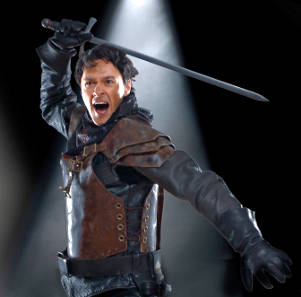
Christopher Luscombe directs Henry V for Chicago Shakespeare Theater (CST) with traditional effects, highlighting the throne onstage in swirling fog while multiple cast members in a shifting spot light cite snippets from the Prologue. Luscombe differentiates opposing sides by color from overhead banners and flags, Henry's newly-uniting Englishmen signified by a red cross on a white background versus the French with their golden fleur-de-lis on a field of blue. Background music swells to a blare then stops in abrupt silence 1.1 as the conspiratorial church authorities emerge in black robes and ominous bells begin to toll in the distance. Luscombe minimizes the impact of the opening scene on his title character, eschewing both seedy manipulation (Branagh's film) and comic bumbling (Olivier's), and instead focusing on Harry Judge's fair-haired boy Henry. Judge's Henry takes the stage 1.2 in head-to-toe black leather with his fellow soldiers, somewhat resembling Hollywood actor Joseph Gordon-Leavitt, especially in the wry crooked grin that reveals a bemused approach to people and events. This Henry lounges in his throne to a trumpet fanfare, one knee up, the other leg out, casual and cool and cocky in his boyish pout. Judge plays the romantic boyish Henry much better than the militaristic avenger King - far more lover than bully, he - as evidenced by his rising but never very angry response to the "tun of treasure" from the Dauphin being a mere basket of black tennis balls. Luscombe accordingly downplays the "youth on fire!" nationalism before 2.1 as well as the treachery of the Southampton traitors: the scene plays to Henry's wounded feelings ("another fall of man!") amid sea gull sound effects and bright white lights after the smiling King strides through the audience. The hanging of old-friend-but-church-thief Bardolph is also marginalized, with the booze-nosed tavern denizen not present at all, certainly lessening the reptilian aspects of this Henry's character, a saddened friend rather than a steely monarch enforcing policy. Some of Judge's best moments come during the post-intermission Touch of Harry scenes in the English camp 4.1, the stage aglow beneath a canopy of twinkling stars, Judge's Henry earnestly moving among his soldiers in disguise, then kneeling and putting his hands together in prayer.
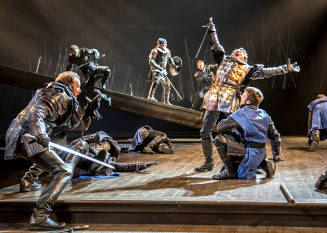
Luscombe stages the Harfleur scenes with considerable power, but with less emphasis than is typical on the leadership of Henry. The multi-voiced Chorus, the speakers within all levels of the theatre - dress circle, balcony, upper gallery - dramatically intone "follow, follow!" amid spotlights and martial drumbeats. An upstage wall collapses 3.1, becoming castle wreckage as well as a handy ramp, and amid sounds of combat and echoing explosions as well as strobe-like flashes of light, the King arrives. Judge's Henry, despite the fiery words - "once more unto the breach!" - is less dramatic and commanding than simply encouraging. The soldiers, some kneeling and some lying down, rise to their feet and follow their King up the ramp. Similarly, when the Mayor appears in the audience 3.3, Judge's weary Henry barely manages to threaten the town's women and children and old men, finally becoming menacing with a seething "open your gates" as his soldiers stir behind him. The sense is more of a battlefield-weary soldier desperate to get his men some rest than a bloodthirsty warrior threatening non-combatants. As the soldiers shuffle off stage right, the King is adamant to Exeter: "use mercy to them all."
Judge's kinder-and-gentler Henry is undermined by a recurring sense of humor, especially in regard to foreign accents and showy gestures. Samuel Taylor's showboat Dauphin wins laughter with 2.4 poses and struts and dramatic gesticulation, but especially with his Monty Python-style outrageous French accent. By 3.7 he is an audience favorite, waddling with his arms out, sniffing mightily at the night-time air, and generally chewing up the scenery: "I have the best armor in the world!" His fellow French noblemen endure him with bemused detachment, lounging upon oversized blue pillows, but a little slapstick goes a long way, and after yet more overplayed battle preparation 4.2, the Dauphin's doggie-downer stoner dejection in 4.5 defeat is a welcome end to the running joke.
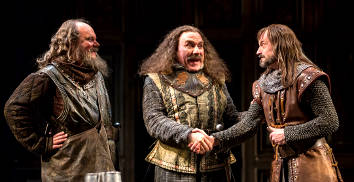
CST veteran Greg Vinkler doubles in an interesting mix of roles, contrasting the defeated humility of the French King against the hemming and hawing, groaning and grunting of Pistol. Luscombe drops a big chandelier to the stage 2.1 to light the atmospheric Boar's Head, a series of worn wooden bar stools and tables. Nym and Bardolph, both bearded and wearing ragged brown clothing, speak very quickly and with difficult Cockney accents, and when Vinkler's Pistol breaks up their bar fight - after a suggestively close Hostess kneels and fixes his belt - the weapon at hand is revealed to be a rubber-bladed toy. Pistol is a colorful cartoon, asking for a group hug after news of the passing of Falstaff, leading the 3.2 flight up the Harfleur ramp and away from an incensed Fluellen, giving a noisy double-stomp and a rigid salute 3.6 before the hanging of Bardolph, and finally strutting like a peacock during his 4.4 "capture" of an injured French soldier.
The actors stress the variety of accents within the play, over-using them to provoke audience response, despite the detraction from the spirit of the drama. The dramatic gathering of the different loyalties of English soldier - Irish, Englishmen, Scots, Welsh - is less a poignant revelation of the rallying power of a King than it is an opportunity to shoot for laughs with some cartoon-huge gestures - Taylor doubles as both the Dauphin and Macmorris - in an exaggerated stream of accents.
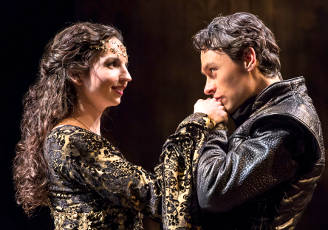
The play is still quite a strong one, and Luscombe's otherwise polished production features some excellent moments from a stalwart Exeter and some poignant maturity from the Boy, but best is the thoroughly charming 3.4 wordplay between the French Princess and Alice as the former attempts to learn the rugged English terms for various body parts. The scene plays with a refreshingly breezy sense of humor, the performers natural, their timing clever, and the overall lightness feels - probably as intended - much like an oasis in a desert. Judge's Henry fares better - and far more convincingly - as a romantic lead than as an action hero. Whereas his battlefield commands seem stiff and slight - the "kill the prisoners" order, for example - Henry's more personal appeals carry significantly more weight. Judge's King makes an earnest 4.3 speech to the nearly defeated English army - "not one man more!" - in an understated but emotional moment that is the highlight of the entire production. After one final from-the-heart appeal - "we few, we happy few, we band of brothers" - there is an eruption of thunder and lightning, and the French soldiers rush the stage through the audience itself, an array of gun-metal gray spikes visible upstage. Amid a series of slow-motion individual combats, Judge's Henry moves to center stage, in slow motion himself beneath a stark spot light, then up the ramp where he is silhouetted at the height of his power, supremely confident in both himself and his soldiers.
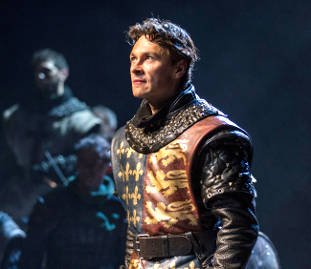
Luscombe concludes with a truncated Act 5, following the awkward business of gloves and gages and disguises in 4.8, and Judge's aw-shucks Henry first hesitates then confidently woos the lissome Kate, hammering out some halting French. Henry attempts an unmannerly and ill-fated kiss, then after emphasizing their social importance as a couple - "we are the makers of manners" - delivers another that is long and lingering. After a genuinely funny revelation of what is (now) uncharacteristic fear of authority - "here comes your father!" - Judge and Luscombe conclude the entertaining if uneven production on a happy-ending note, as might be expected from a staging that focuses on the lighter side of Henry V and features such an over-abundance of slapstick humor.